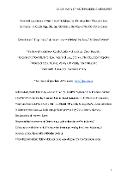Perceived Legitimacy of Anti-Pandemic Measures: Findings from West and East Germany, the Czech Republic, and Slovakia at the Peak of the COVID-19 Crisis

Autor
Lacko, David
Klicperová-Baker, Martina
Jan, Šerek
Boehnke, Klaus
Datum vydání
2023Publikováno v
Psychology, Public Policy, and LawRočník / Číslo vydání
29 (4)ISBN / ISSN
ISSN: 1076-8971Metadata
Zobrazit celý záznamKolekce
Tato publikace má vydavatelskou verzi s DOI 10.1037/law0000395
Abstrakt
This interdisciplinary study examines the cross-cultural differences between the perceived legitimacy of anti-pandemic measures during the peak of the COVID-19 crisis in three Central European countries and four independent samples (West Germany, East Germany, the Czech Republic, Slovakia). A total of 2,752 participants completed a newly developed 7-item scale which inquired whether governmental regulations were perceived as fair, justified, and based on science and whether the government considered citizens' needs and the interests of their country, etc. Analysis was done within the structural equation modeling framework. Scalar measurement invariance was successfully established between the studied countries, and a subsequent latent means comparison supported the hypothesis that German respondents would report higher legitimacy of the governmental anti-pandemic regulations than respondents from the Czech Republic and Slovakia. Additionally, as expected, the participants from the new German Länder (former East Germany) also manifested a consistent tendency to view governmental regulations as less legitimate than their Western fellow citizens. The results are discussed in terms of normative factors (i.e., the qualities of the authority which adopted the anti-pandemic measures, the qualities of the procedure through which these measures were adopted, and the qualities of the measures themselves) and psycho-socio-cultural factors (e.g., post-communist syndrome) and the influence of demographic variables.
Klíčová slova
legitimacy, anti-pandemic measures, trust in government, COVID-19 pandemic, Central Europe
Trvalý odkaz
https://hdl.handle.net/20.500.14178/1897Licence
This paper is not the copy of record and may not exactly replicate the final, authoritative version of the article. Please do not copy or cite without authors' permission. The final article will be available, upon publication, via its DOI: 10.1037/law0000395





